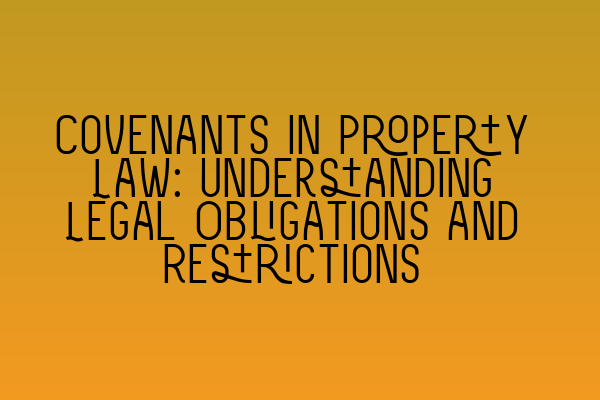**Covenants in Property Law: Understanding Legal Obligations and Restrictions**
When it comes to property law, understanding the concept of covenants is crucial. Covenants are legal obligations and restrictions that are attached to a property and bind both the current and future owners. These obligations and restrictions are put in place to ensure certain actions are taken or avoided, with the aim of protecting the rights and interests of all parties involved.
In this blog post, we will delve into the world of covenants in property law, exploring their types, implications, and how they can impact property owners. Whether you’re a first-time buyer or a seasoned property investor, having a comprehensive understanding of covenants is essential for navigating the intricacies of property transactions.
**Types of Covenants:**
Covenants can be broadly classified into two categories: positive covenants and restrictive covenants.
*Positive Covenants:*
Positive covenants require the property owner to perform certain actions. These can include obligations such as maintaining the property in a certain condition, paying service charges, or contributing to the upkeep of shared amenities. Positive covenants are put in place to ensure that the property and its surroundings are well-maintained, enhancing the quality of life for all residents.
*Restrictive Covenants:*
On the other hand, restrictive covenants prohibit property owners from carrying out certain actions or activities on their property. These restrictions can relate to a wide range of matters, such as the type of modifications that can be made to the property, the use of the property for specific purposes, or even the color of the property’s exterior. Restrictive covenants aim to preserve the character and integrity of a neighborhood, ensuring that the property remains in line with the surrounding properties.
**Implications of Covenants:**
Covenants can have significant implications for property owners, both in terms of their rights and obligations. Failing to comply with the terms of a covenant can lead to legal action, fines, or even an injunction that restricts further actions on the property.
It’s crucial to carefully review and understand the covenants attached to a property before entering into any purchase or lease agreements. Failure to do so could result in unforeseen expenses or restrictions that negatively impact your intended use or enjoyment of the property.
**Enforcement of Covenants:**
The enforcement of covenants varies depending on the circumstances and the nature of the covenant. In some cases, covenants create a legal relationship between the parties involved, allowing them to enforce the terms directly. However, in other instances, covenants can only be enforced by specific authorized individuals or organizations, such as residents’ associations or management companies.
If you find yourself facing issues related to the enforcement of covenants, seeking legal advice from a property law solicitor is highly recommended. A solicitor can guide you through the process, ensuring that your rights are protected and assisting you with any necessary legal action.
**Navigating Covenants in Property Transactions:**
When embarking on a property purchase or lease, it’s essential to consider the covenants attached to the property. Understanding the implications and restrictions imposed by these covenants can help you make informed decisions and avoid potential legal disputes in the future.
Before committing to a transaction, conduct thorough due diligence and review all relevant documentation, including title deeds, planning permissions, and any existing agreements. Consulting with a property law solicitor can provide you with peace of mind and professional guidance throughout the process.
**Conclusion:**
Covenants in property law play a vital role in protecting the interests of property owners, residents, and communities. Understanding the types, implications, and enforcement of covenants is crucial for navigating property transactions successfully.
If you require expert legal advice or assistance with covenants, our team of highly qualified property law solicitors at SQE Property Law & Land Law can help. Contact us today to discuss your specific situation and ensure that your property transactions are conducted in compliance with all relevant covenants.
For more information on related topics, explore the following articles:
– [SQE 1 Practice Exam Questions](https://fqps.co.uk/sqe/sqe1-preparation/mcq-practice-quiz)
– [SQE 1 Practice Mocks FLK1 FLK2](https://fqps.co.uk/sqe/sqe1-preparation/practice-mocks-quiz)
– [SQE 2 Preparation Courses](https://fqps.co.uk/sqe/sqe2-preparation)
– [SQE 1 Preparation Courses](https://fqps.co.uk/sqe/sqe1-preparation)
– [SRA SQE Exam Dates](https://fqps.co.uk/sqe/sqe1-sqe2-exam-dates)
Our team at SQE Property Law & Land Law is committed to providing comprehensive legal services tailored to your needs. Trust us to handle your property law matters with professionalism and expertise. Contact us today to schedule a consultation.
